MercoPress. South Atlantic News Agency
Tag: Argentine economy
-
Thursday, June 21st 2018 - 06:55 UTC
A good one for Macri: MSCI decides to reclassify Argentina as an emerging market

Index provider MSCI said on Wednesday it will reclassify Argentina as an emerging market and begin including Saudi Arabia in that classification, sharply broadening the investor base for both countries in a move that could be supportive of their equity markets. The decisions will be effective beginning in mid-2019.
-
Thursday, May 31st 2018 - 09:01 UTC
Argentine Senate votes 37 to 30 to freeze utility rates; Macri expected to veto the bill
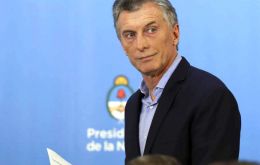
Following twelve hours of heated and at time acrimonious debate the Argentine Senate on early Thursday voted, 37 to 30, to freeze utility prices. President Mauricio Macri had anticipated that if the bill was passed he would veto it because there is no way the budget can stand an additional 1% of GDP deficit.
-
Monday, May 14th 2018 - 08:20 UTC
The Economist: Will Argentina's woes spread?
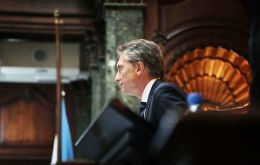
Argentina has much in common with yesterday's emerging markets, but little in common with today's
-
Friday, May 11th 2018 - 05:39 UTC
IMF and White House support Macri's economic reform program

International Monetary Fund chief Christine Lagarde said on Thursday she is ready to aid Argentina and wants talks on a financing package to be finalized quickly. Lagarde said she instructed the IMF team to continue discussions on a loan program with the goal to “reach a rapid conclusion.”
-
Wednesday, May 9th 2018 - 20:19 UTC
US Dollar rises: Uruguay behind Argentina
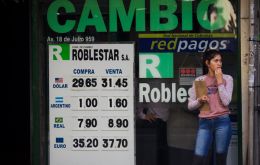
After several days up in Argentina, the devaluation of the Argentine peso and the rise of the US dollar have had some impact on the other side of the River Plate, where the exchange houses of downtown Montevideo marked on Wednesday the value of the currency up to 31,70 Uruguayan pesos per dollar, a rise of 2.08% compared to Monday —the highest in five years—. For the Uruguayan government, the country follows the global trend and calls for calm, beyond the noise generated in Argentina, which is beginning a dialogue between the Finance Minister, Nicolás Dujovne, and the International Monetary Fund (IMF) in Washington.
-
Friday, March 23rd 2018 - 09:06 UTC
Argentina expanded 2.9% last year; 2018 challenging given the persistent drought effect on crops

Argentina's economy expanded 2.9% in 2017 from the prior year and 3.9% in the fourth quarter versus the same period in 2016, the Indec statistics agency said this week. The year-over-year figure was slightly above the 2.8% annual growth rate given last month by Argentina's monthly economic activity indicator, seen as a proxy for gross domestic product.
-
Tuesday, February 20th 2018 - 09:23 UTC
Union leader political rally in Buenos Aires to challenge Macri and his policies
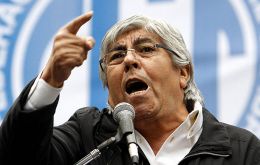
The Argentine powerful teamsters union will be holding their first political rally in downtown Buenos Aires this Wednesday in a clear defiance of President Mauricio Macri's policies to combat inflation, launch the economy and attract foreign direct investors. Hugo Moyano a member of the unions' umbrella organization has promised to convene some 300.000 workers and has anticipated that any incidents will be the responsibility of the government.
-
Thursday, September 28th 2017 - 21:54 UTC
Argentine economy picked up speed in July expanding 4.9% from a year earlier
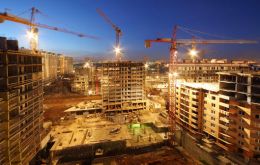
Argentina's economic recovery picked up speed in July, expanding 4.9% from a year earlier as President Mauricio Macri's pro-growth policies appeared gain traction. July's year-over-year expansion is the highest posted by Argentina in more than two years and it moves the country closer to hitting its target of 3% growth this year.
-
Sunday, May 14th 2017 - 09:05 UTC
Argentine officials confident economy exited recession and should grow 3% this year
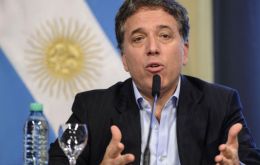
Argentine Treasury Minister Nicolas Dujovne said he was confident the economy would grow more than 3% this year, while another treasury official said the economy had rebounded in March after declining the prior two months.
-
Friday, April 28th 2017 - 03:03 UTC
Argentine economy contracted in February, but in March consumer confidence is picking up
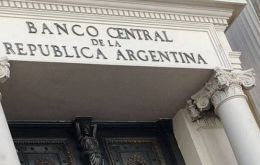
Argentina's economy contracted 2.2% on the year in February, indicating that the country's widely expected fiscal recovery may end up being slower than anticipated this year. The economy also shrank 1.9% from the previous month, the national statistics agency Indec reported. The data come after Argentina's economy grew 1.4% on the year in January.
